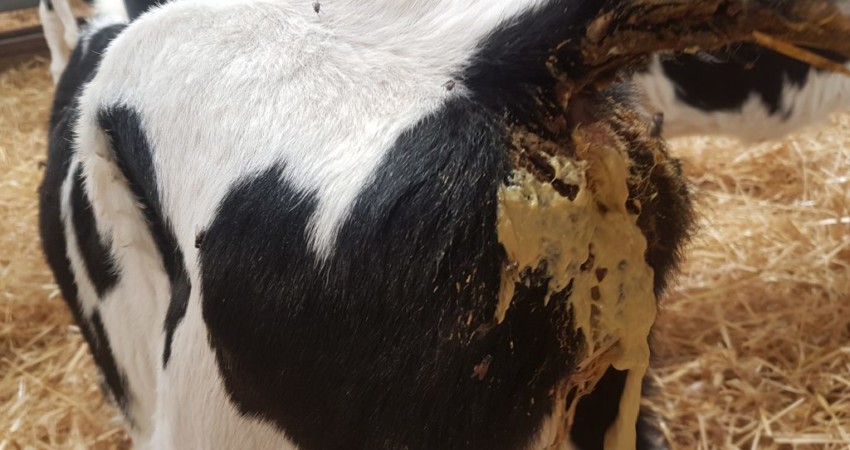

Scours is the cattleman’s term for severe, watery diarrhea that usually affects calves. Scours is the primary cause of death for calves younger than a month old. When you see a calf beginning to scour, quick action can mean the difference between life and death for the calf. A young calf is about 70 percent water, and severe scours can mean that the calf can’t replace lost fluids quickly enough to maintain his system. Dehydration will lead to a quick death if you don’t intervene.
If you find a calf with a messy bottom, take a few minutes to watch him. Are his eyes bright and his demeanor perky? If so, just keep an eye on him for the next day or two, but don’t let more than 8 hours pass without checking on him. If at any time his scours progress to include the following symptoms, you will need to intervene.
Lethargy, Loss of Appetite, Fever (normal calf temperature taken rectally is 101.5), Cold Mouth and Ears, Dull Eyes and Droopy Ears
If your calf is beginning to get sick, you can get an antibiotic bolus (calf pill) from your vet to help him get well. These pills are fairly inexpensive, and even if they don’t help destroy the agent that caused scours, they will keep other infections from taking hold while he is under the weather.
The most important thing for you to do for a scouring calf, however, is to get him hydrated and keep him hydrated. To do this, you will need to give him plenty of calf electrolyte solution. This liquid is like Pedialyte for calves. It includes crucial salts that he needs to stay healthy that plain water won’t provide. You can try to give him this liquid from a bottle, but if he won’t take it, you should force it into his system with an esophageal feeder. He may not feel like suckling, but he has to replace the lost fluids or he will die.
Calves that are scouring severely need a gallon and a half of fluids each day for the first day or two, divided into three feedings. It may seem like a lot of liquid, but if he gets too much, he will just excrete it as urine. Once he gets rehydrated, you can gradually cut back the fluids that you are giving him.
In the past, farmers were advised to withhold milk or milk replacer from scouring calves. However, this is no longer advised. The calf can have his normal feedings if he feels like eating, or you can just leave him with this mother. He will need the energy that regular milk feedings will provide. However, you should never mix electrolytes with his milk because it can interfere with the digestion of his milk. Wait a few hours after you give him milk before you give him electrolyte.
Calves with scours can become very weak and chilled. Be sure to keep him in a warm, dry area. Try to keep the calf’s area as clean as you can, since lying in a puddle of fecal matter is unhealthy for him. Additionally, keep the scouring calf isolated from other calves, since the organisms that cause scours are extremely contagious
If your calf is severely dehydrated when you find him, you will want to take him to a vet for intravenous treatment. Oral fluids may not absorb quickly enough to save him if he is too dehydrated. If your calf exhibits the following symptoms, he probably needs veterinary care to survive.
Calf Lying Flat and Non-Responsive
A Fold of Neck Skin Stays “Tented” When Pinched
Eyes are Deeply Sunken
Cold Limbs
Mouth and Tongue Cold and Dry
One more thing. If you are dealing with a scouring calf, don’t only rely on bleach and alcohol based hand sanitizers for cleaning. Cryptosporidium, a common parasite that causes scours in calves, cannot be destroyed by these sanitizers. You will need to wash away the protozoans with plenty of soap and water. Keep in mind that scour-causing organisms like crypto, salmonella, and e. coli can make you very sick as well, so be extremely careful with gloves, jackets and hand washing to keep your other animals and your family healthy.
 Contact Jaguza Support
Contact Jaguza Support